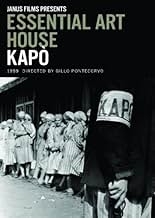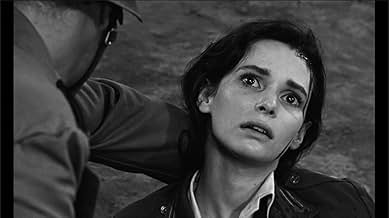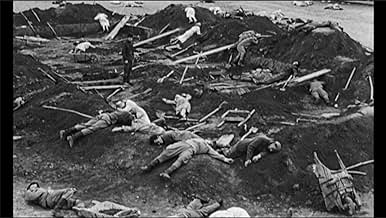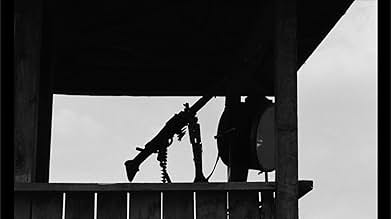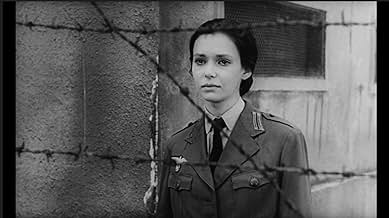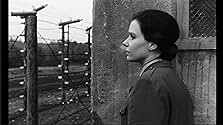AVALIAÇÃO DA IMDb
7,6/10
2,8 mil
SUA AVALIAÇÃO
Adicionar um enredo no seu idiomaA young Jewish girl leads an escape attempt from a concentration camp.A young Jewish girl leads an escape attempt from a concentration camp.A young Jewish girl leads an escape attempt from a concentration camp.
- Direção
- Roteiristas
- Artistas
- Indicado a 1 Oscar
- 3 vitórias e 4 indicações no total
Semka Sokolovic-Bertok
- Une detenuta
- (as Semca Sokolovic)
Dirjana Dojic
- Ninette
- (as Dirjana Dojc)
Graziella Durano
- Une detenuta
- (não creditado)
Sima Janicijevic
- Il medico di Auschwitz
- (não creditado)
Rastislav Jovic
- Yanko Milovich
- (não creditado)
Dusan Perkovic
- Il commandante tedesco
- (não creditado)
Avaliações em destaque
If somebody would like to see what was a nazi prison, one has to see this movies. It showed with realism the nature of cruelty by nazis and the ways they used some of their prisoners to watch the movement of the rest and to combat effectively any possible plot against them. Pontecorvo is a director with a few films, but all of them always show real facts of the history, and this film is not an exception
Edith is a Jewish teen whose family is among those loaded onto boxcars and shipped to Auschwitz. This is a story of brutality and Susan Strasberg ("Picnic") plays the central character who struggles to survive the Nazi holocaust machine.
Shot in black and white, of course, the film provides a stark and nearly unrelenting look at the depravity, deprivations, and degradations found in concentration camps. Strasberg is strong in her role, embodying the chameleon-like ability to change that gives her character a chance to survive, though survival has its price.
The action feels real, the locations feel real, and real emotions are evoked by this ambitious attempt to delve into the real human costs of barbarism---the loss of principles, the corruption of dignity, and the subtle shadings of resistance.
The Italian producers of this film pursued Strasberg for this role, somehow knowing that she had the depth within her to bring Edith to life on the screen. Her father, Lee, recommended she accept the role. Luckily, she did.
Shot in black and white, of course, the film provides a stark and nearly unrelenting look at the depravity, deprivations, and degradations found in concentration camps. Strasberg is strong in her role, embodying the chameleon-like ability to change that gives her character a chance to survive, though survival has its price.
The action feels real, the locations feel real, and real emotions are evoked by this ambitious attempt to delve into the real human costs of barbarism---the loss of principles, the corruption of dignity, and the subtle shadings of resistance.
The Italian producers of this film pursued Strasberg for this role, somehow knowing that she had the depth within her to bring Edith to life on the screen. Her father, Lee, recommended she accept the role. Luckily, she did.
This film relates the story of a 14-year-old Jewish girl during her captivity in a Nazi concentration camp. Her role is portrayed by 21 year old Susan Strasberg who had portrayed Anne Frank on stage and Kim Novak's little sister, Millie Owens, in Picnic (1955). Kapò was nominated for an Academy Award for Best Foreign Language Film in 1960, when the Oscar went to Ingmar Bergman's The Virgin Spring.
In 1966, another Gillo Pontecorvo film---The Battle of Algiers--would be nominated in that same category. That year the Oscar went to A Man and a Woman. (I think that the Academy 'missed the boat THAT year!! The idea that The Battle of Algiers could be missed for its greatness is hard to imagine!)
As Kapò begins, Edith (Susan Strasberg), has just finished her harpsichord lesson and is going home when she sees her parents being arrested by the Nazis. When she runs to them, she too, is arrested. The family is transported in a boxcar to a concentration camp in Poland. Once there, the she is separated from her parents and taken to a separate cell block. Anxious to find them, she enters their cell block where we see the film's first terrible images of the over crowed and starving prisoners. While she is unable to find her parents, another female prisoner, Sofia (Didi Perego), sees her there and takes her to a camp doctor for help. Since Edith is new to the camp--and another girl her age had just died the night before--the doctor instructs her how to change her identity and be saved from certain death. As he explains, the prisoners are treated differently based on which patch they have on their smocks: a yellow Star of David indicates that they are Jews; a red patch (such as the doctor's) identifies them as political prisoners; and a black triangle indicates that they are criminals. The doctor tells Edith that she must cut her hair, change her clothes with those of the dead girl and take on a new identity, as Nicole Niepas, a non-Jewish criminal (with a black triangle on her smock).
Camp police (kapòs) are chosen from among the criminal group. They are hated by their fellow prisoners but useful to the SS officers who use them as their eyes and ears within the cell blocks. By being harsh on the other prisoners and reporting any resistance or planned insubordination to their Germans captures, the kapos are given special privileges such as food, clothing, and use of sanitary facilities. But, most importantly, if they do their jobs well, they are not likely to be exterminated with the other prisoners.
Later, Edith sees her parents being marched off to be killed in the gas chamber. With all hope lost, Edith (as Nicole Niepas) becomes a kapo. Her transformation from victim to 'victimizer' increases as she reports the activities of other prisoners and fraternizes with a German soldier in the camp. (She loses her virginity to one of the soldiers in the camp.) Her personal harshness is diminished when Russian POWs are taken to the same concentration camp and she falls in love with the Russian soldier, Sascha (Laurent Terzieff). As the Allies approach the camp near the end of the war in Europe, she agrees to take part in a daring escape plan. But, the as the plan takes shape, we realize that it is not totally without sacrifice..
In 1966, another Gillo Pontecorvo film---The Battle of Algiers--would be nominated in that same category. That year the Oscar went to A Man and a Woman. (I think that the Academy 'missed the boat THAT year!! The idea that The Battle of Algiers could be missed for its greatness is hard to imagine!)
As Kapò begins, Edith (Susan Strasberg), has just finished her harpsichord lesson and is going home when she sees her parents being arrested by the Nazis. When she runs to them, she too, is arrested. The family is transported in a boxcar to a concentration camp in Poland. Once there, the she is separated from her parents and taken to a separate cell block. Anxious to find them, she enters their cell block where we see the film's first terrible images of the over crowed and starving prisoners. While she is unable to find her parents, another female prisoner, Sofia (Didi Perego), sees her there and takes her to a camp doctor for help. Since Edith is new to the camp--and another girl her age had just died the night before--the doctor instructs her how to change her identity and be saved from certain death. As he explains, the prisoners are treated differently based on which patch they have on their smocks: a yellow Star of David indicates that they are Jews; a red patch (such as the doctor's) identifies them as political prisoners; and a black triangle indicates that they are criminals. The doctor tells Edith that she must cut her hair, change her clothes with those of the dead girl and take on a new identity, as Nicole Niepas, a non-Jewish criminal (with a black triangle on her smock).
Camp police (kapòs) are chosen from among the criminal group. They are hated by their fellow prisoners but useful to the SS officers who use them as their eyes and ears within the cell blocks. By being harsh on the other prisoners and reporting any resistance or planned insubordination to their Germans captures, the kapos are given special privileges such as food, clothing, and use of sanitary facilities. But, most importantly, if they do their jobs well, they are not likely to be exterminated with the other prisoners.
Later, Edith sees her parents being marched off to be killed in the gas chamber. With all hope lost, Edith (as Nicole Niepas) becomes a kapo. Her transformation from victim to 'victimizer' increases as she reports the activities of other prisoners and fraternizes with a German soldier in the camp. (She loses her virginity to one of the soldiers in the camp.) Her personal harshness is diminished when Russian POWs are taken to the same concentration camp and she falls in love with the Russian soldier, Sascha (Laurent Terzieff). As the Allies approach the camp near the end of the war in Europe, she agrees to take part in a daring escape plan. But, the as the plan takes shape, we realize that it is not totally without sacrifice..
Quite an excellent character study of what people will do to survive. Although not as powerful as other prisoner of war films such as "Seven Beauties" it stands out because of the performances of all the women and especially Susan Strasberg who does a magnificent job starting out as the young innocent girl, hiding the fact that she is Jewish, a bewildering task, and her agonizing evolution into a hardened guard.
Don't look for huge sets and gruesome scenes of gas chambers and ovens here. It's not that type of film. It's a simple story of the slow chipping away of humanity that dire conditions force. Dignity and nobility give way to cruelty and inhumanity and simple survival becomes a thing to justify as time goes on. By telling this type of story through the eyes of a young impressionable person is excellent.
Don't look for huge sets and gruesome scenes of gas chambers and ovens here. It's not that type of film. It's a simple story of the slow chipping away of humanity that dire conditions force. Dignity and nobility give way to cruelty and inhumanity and simple survival becomes a thing to justify as time goes on. By telling this type of story through the eyes of a young impressionable person is excellent.
This Italian film, following the travails of a young Jewish girl in a Nazi work camp, is successful due mainly to its realistic sets, and the performances of Strasberg and Terzieff. Supporting cast members also shine throughout the film. The whole concept of the "kapo" is new to me, and it added a further dimension to the horrific Nazi experience not covered in films such as "Sophie's Choice" and "The Pianist." Deservedly, it was nominated for an Academy Award (Best Foreign Language Film) in 1960. Strangely enough, most filmographies of Strasberg fail to highlight her incredible performance in this film. Certainly, it must have reflected her performance as Anne Frank on Broadway. The same year as "Kapo," George Stevens released his film version of "Anne Frank," starring Millie Perkins, who took the role once Audrey Hepburn turned it down. Certainly, Strasberg must have been considered.
A "kapo" was a prisoner of a concentration camp that watched over the other prisoners in a specified group. A kapo received better clothing, food, and was not required to work. 2001's "The Grey Zone" would be an appropriate double-feature with this film.
A "kapo" was a prisoner of a concentration camp that watched over the other prisoners in a specified group. A kapo received better clothing, food, and was not required to work. 2001's "The Grey Zone" would be an appropriate double-feature with this film.
Você sabia?
- CuriosidadesThe producers imposed a romance line in the story and also another ending, different from the one Pontecorvo, the director, wished to shoot.
- Erros de gravaçãoIn the opening scene, Edith walks past some shops on her way back home. One of the shops look like it belongs to the booming 1950s than the more austere WWII period. There is a toy car or baby push car in the store window that shows the typical car design of the 1950s.
- Citações
Edith, alias Nicole Niepas: [to Sasha] Your mother won't like me, I'm not a good girl, and my name's not Nicole, I'm a Jew.
- ConexõesFeatured in Pontecorvo: The Dictatorship of Truth (1992)
Principais escolhas
Faça login para avaliar e ver a lista de recomendações personalizadas
- How long is Kapo?Fornecido pela Alexa
Detalhes
- Tempo de duração
- 1 h 57 min(117 min)
- Cor
- Mixagem de som
- Proporção
- 1.66 : 1
Contribua para esta página
Sugerir uma alteração ou adicionar conteúdo ausente


